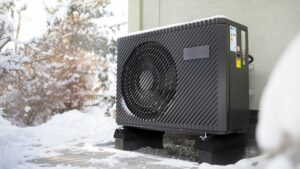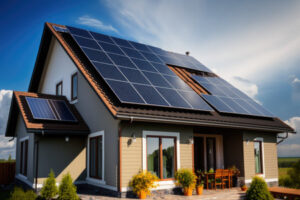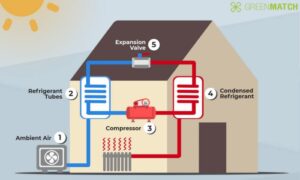The prominence of heat pumps in the future of home heating is a subject of much debate among experts. The rising interest in heat pumps is driven by several factors, including concerns about climate change, advances in heat pump technology, and the push for renewable energy integration. Here are some reasons why heat pumps might become a leading choice for home heating in the future:
- Energy Efficiency: Heat pumps are highly efficient as they simply transfer heat rather than generating it from a fuel source. This can lead to significant energy savings for homeowners.
- Carbon Emissions: With the global emphasis on reducing carbon emissions, heat pumps, especially when powered by renewable electricity sources, can play a significant role in achieving these goals.
- Versatility: Heat pumps can both heat and cool a home, making them a two-in-one solution suitable for varying climates.
- Integration with Renewable Energy: As the grid becomes more populated with renewable energy sources like solar and wind, electric solutions like heat pumps will be more sustainable.
- Falling Costs: As with many technologies, costs for heat pumps are expected to decrease over time with advances in manufacturing, increased competition, and economies of scale.
- Government Incentives and Policies: Many governments are offering incentives for energy-efficient technologies, and some areas might even introduce regulations that favor or mandate the use of such technologies for new buildings.
- Advancements in Technology: Modern heat pumps can operate efficiently in colder temperatures than earlier models, expanding their usability to more regions.
However, there are challenges and considerations: - Upfront Cost: The initial investment for heat pump systems, especially ground-source (geothermal) systems, can be higher than traditional heating systems.
- Electricity Grid Demand: A mass shift to electric heat pumps could place additional demand on electricity grids. This would require infrastructure upgrades and an increased push for renewable energy sources.
- Climate Suitability: While newer models are designed to work in colder climates, extremely cold regions might still pose challenges for air-source heat pumps.
- Existing Infrastructure: Many homes are already equipped with heating systems that use natural gas or oil. Transitioning would require homeowners to weigh the cost and benefits of replacing their existing systems.
- Consumer Awareness: Not all homeowners are aware of the benefits of heat pumps, so educational campaigns and incentives might be needed.
In summary, while it’s challenging to definitively say whether heat pumps will become the number one choice for home heating worldwide, their adoption is likely to increase, especially in regions where they are economically and climatically favorable. Their role in future home heating will largely depend on technological advancements, policy decisions, economic factors, and global efforts to combat climate change.
In the ever-evolving world of online marketing, landing pages have become an essential tool for driving conversions and generating leads. High-converting landing pages are the linchpin of any successful marketing campaign. They are designed to grab your visitors’ attention, showcase your value proposition, and persuade them to take action. But what makes a landing page truly effective? In this comprehensive guide, we will unlock the secrets of high-converting landing pages and provide you with actionable tips to boost your conversion rates.






